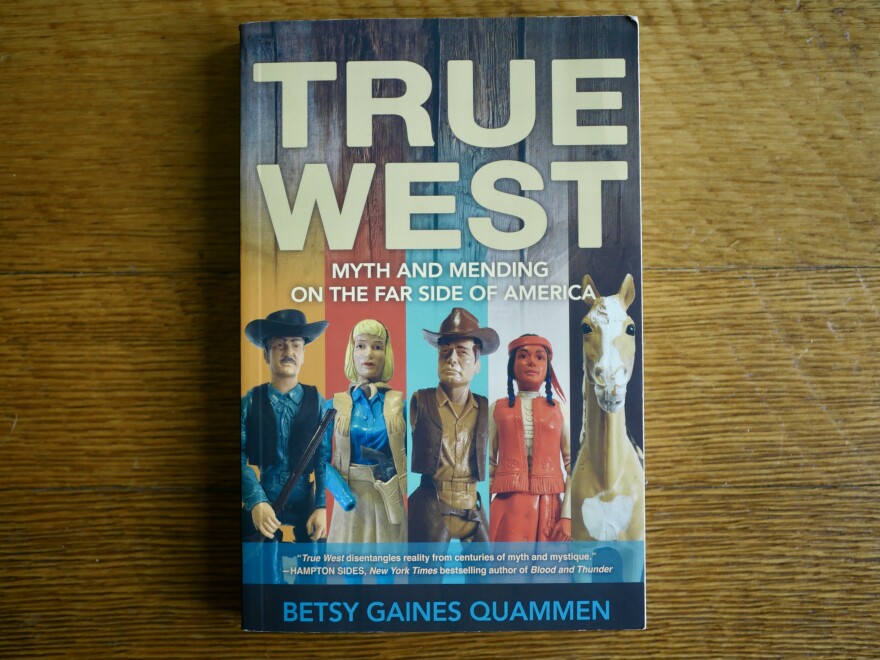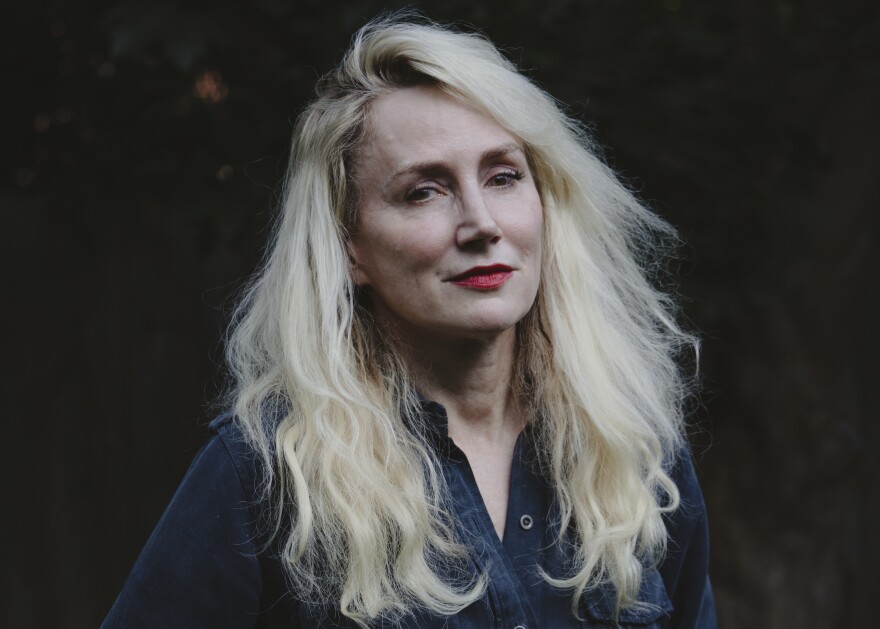Betsy Gaines Quammen is the author of a new book titled "True West: Myth and Mending on the Far Side of America." The book explores polarization, extremism, and the impact of the pandemic on the landscapes and communities of the West.
Quammen will speak about her new book "True West" at the Teton County Library in Jackson on February 15 as part of the "Rest of the West Series," a collaboration with the Jackson Hole Historical Society and Museum to explore lesser-known narratives about the American West. The author will also speak at the Alta Branch Library in Alta on February 16.
Wyoming Public Radio's Hannah Habermann spoke with Quammen about what she learned in the process of writing the book.
Editor’s note: This interview has been lightly edited for brevity and clarity.
Hannah Habermann: "True West" starts with a scene of an ice cream truck slowly winding through an empty smoky block during the wildfire-heavy summer of 2021. Then you describe the historic flood that washed through Yellowstone National Park the next summer. In addition to this increase in extreme weather events, what are some of the other big changes that you've seen taking place throughout the West?
Betsy Gaines Quammen: We're on the front lines of climate change, as you said. We have droughts, we have fires, we have floods. In particular, during pandemic and polarization, the West became this sort of idea for people, a place that really was a mythological landscape. We saw people coming here because they'd seen the show "Yellowstone" and, all of a sudden, they were envisioning wide open spaces and ultra freedom, these notions that have been attached to the West.
We were also seeing people thinking, 'Oh, the West is a safe and healthy place. Let's head out west where we can be outside and be away from the pandemic.' As a result, the pandemic was brought to small western towns, putting pressure on small western health clinics. This is a mythology that goes back even to tuberculosis – people coming out west, looking at the West as a place to heal tubercular lungs.
The other thing that happened, that I talk about, is that the West became a lure for people seeking homelands. This really ties into the work that I do on extremism. The West became this place – and I say became, it has been this for a while – that this is a place where people are coming to build like-minded communities. You see this quite a bit in western Montana, in the Idaho panhandle, and in Wyoming too. You know, this is a place where 'Let's await the second coming' or 'Let's get ready for a civil war.'
That goes back to these ideas that the West is a blank slate, which of course we know it's not. It was not a blank slate when that was promoted by Manifest Destiny and this whole movement to say, 'Come out west and buy your little homestead and create a farm or a ranch,' and 'Rain follows the plow,' that myth.
And then it came up again, it's been reiterated and reiterated. During COVID, it was, 'Let's move west and create a new life. We can work remotely.' It plays into these myths that people had about the West.

HH: Your book is filled with so many stories and interviews with people from a really wide range of both political perspectives and just different backgrounds. For you, what was an interview or two that really stood out and why did it stand out to you?
BGQ: I had so many interviews with people that surprised me and I loved that about [the book]. I went and spoke with the director of the Creation Museum in Montana, it labels itself a dinosaur museum and it is a Christian explanation of the Old Testament. It says that the Earth is 6000 years old and that humans and dinosaurs lived on the Earth at the same time.
When I was talking to the director there, he was actually very, very open about everything except for talking about climate change; he did not want to talk about climate change. But he had gotten vaccinated and I was surprised. I mean, that was something that I had to reconsider my assumptions in terms of what people were doing and how they were reacting to the pandemic.
HH: From your experience writing this book, what were some tools or tricks that helped you connect with people, and helped you listen and have these conversations?
BGQ: My first contact was a woman who worked with various communities throughout the rural West. She started to introduce me to people, and then those people introduced me to people, and then those people introduced me to people. I had an unbelievable opportunity with networks.
And then I would just call people and say, 'Do you want to meet me for a cup of coffee and just chat about anything you want to chat about?' I was saying, 'I'm really interested in polarization and your take on that.' I was very clear about my particular beliefs, but I wasn't arguing with anybody. I was just asking them questions.
I think there was something about that moment in time where people had not been talking to other people outside of their little bubble. People just wanted to talk. I'm not sure I have any specific skills other than I was just there and I was really interested.
I think it's important to remember that, although there are a lot of people out there that are benefiting from our polarization – I'm talking about politicians, I'm talking about click bait – some of the polarization, we can get around.
HH: We've talked about myths and you've just touched on this concept of mending. How can we get around that polarization or rebuild those connections? Are there other things that you think could help heal some of these deep divides and maybe correct some of these misunderstandings throughout the West?
BGQ: When I talk about myths, I really am talking about it from the standpoint of expectations of a place that doesn't exist: the idea of endless resources and the idea of Manifest Destiny and the idea of an empty landscape, and even the idea even of wilderness as an unpeopled place. We know that Indigenous people have been out here; they're not places that are untrammeled, even though I think that those of us living in and around so much public land, white people who started these preservation movements, really had intentions of protecting the landscape. But leaving out the history of Indigenous people, it is a really, really important myth to confront and to deconstruct.
There are things that we need to acknowledge, or we're living in a place of toxic myths. And that's not a healthy way to live in the West.
HH: Anything we haven't touched on that you want to add to our conversation?
BGQ: When I talk about the book, one of the things that I am not able to quite communicate is that, number one, it's supposed to be funny. I want there to be the recognition that we were living through an incredibly dark time and continuing to live through a really difficult period, but I wanted there to be a light-heartedness.
I do feel like that happens when we're in relationship with each other. One of the things that we do have in common is a sense of humor, so that was an important piece of this book, because it does cover so many heavy and important topics: from colonialism to stolen land to these politics that are ripping us apart to what Q-Anon did to families. I talked about wolves and wildlife and public lands and polarization. There's so many topics that actually wrapped up together in ways that were daunting. I really look at the interconnectedness of all these things in the West, but I also hope that it's a fun book to read.








